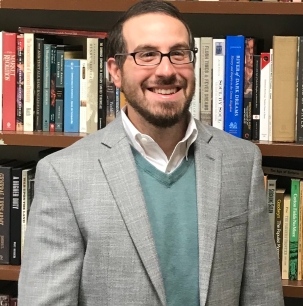 Matthew Sparacio graduated Va Tech with an MA in History in 2010. He is the current instructor of Native American, Colonial, and Trans-Mississippi History at Southeastern Oklahoma State University in Durant, OK.
Matthew Sparacio graduated Va Tech with an MA in History in 2010. He is the current instructor of Native American, Colonial, and Trans-Mississippi History at Southeastern Oklahoma State University in Durant, OK.
Q: After graduating from Virginia Tech’s M.A. program, what have you done professionally?
A: I was uncommitted as to whether I would pursue a Ph.D when I first enrolled in Tech’s M.A. program, but by my second year I knew that I wanted to continue teaching and researching. So after graduating from Virginia Tech’s M.A. program, I returned to my home state of New Jersey and adjuncted at Union County College. After a year I applied for graduate programs and was fortunate to receive an assistantship from Auburn University. I entered Auburn’s Ph.D. program in 2012 and completed my dissertation research on eighteenth century Native American history in spring 2018, aided in large part by a Robert L. Middlekauff Fellowship from the Huntington Library. I also served as a graduate coordinator for Auburn’s Miller Writing Center. For the 2018-2019 academic year I had the opportunity to be an instructor of World History at Auburn. In April 2019 I was offered a full time position at Southeastern Oklahoma State University, where I am currently wrapping up my first semester teaching.
Q: What is one thing that you did at Virginia Tech that aided you in your professional or academic path?
A: Working as a GTA for Randy Shifflett and taking his Early American History graduate seminar really introduced me to Native American history, and convinced me to dive deep into the late sixteenth and early seventeenth century history of Virginia. Although my dissertation moved me into the eighteenth century, an appreciation for ethnohistory and centering Native American voices began at Virginia Tech. Additionally, working with Richard Hirsch and Heather Gumbert profoundly influenced the way I approach all aspects of my teaching, from engaging discussion topics to developing and grading students’ written assignments.
Q: What advice would you give current or future students wanting to pursue a path similar to yours?
A: I think there are two pieces of advice that I wish I took more seriously when I first entered graduate school. First, make sure that you don’t over-extend yourself with your work commitments. Academy-wide recognition of this concern has been floating around the last couple of years (especially on Twitter among the #twitterstorians), but I’ll add my voice to the chorus: make sure you are taking care of yourself mentally and physically. Sometimes the amount of work that you are facing seems insurmountable, but it takes some time to figure out each semester’s time management. Seek out mentors who you feel comfortable with reaching out to when things get a little chaotic. Second, if you have the opportunity, make sure to pick up a certificate in public history or a related field. The classroom is only one of many ways that you can share history with others. As the job market continues to tighten, having foundations in a number of fields will make you more a more attractive candidate once you hit the job market or begin applying to Ph.D. programs in History, Education, Public History, or Archives.
Q: What has been a major challenge you have encountered in your career? How have you dealt with it?
A major challenge that I have encountered – and still do from time to time – is the overwhelming need to over-prepare to feel comfortable leading a class discussion. I think one of the reasons we become teachers is because we love our subjects so much, and find them endlessly fascinating. We want to share everything we know with our students. That just doesn’t work – bludgeoning students with content may allow you as a teacher to discuss what *you* like, but may actually be a disservice to students, who are going to feel overwhelmed. So over the years I’ve devoted much more time at the beginning of each semester to really interrogate my course syllabi (especially for new course preps) and having frank and honest discussions with myself and other teachers in the departments I’ve been in about course objectives – what do I want my students to take away from the course? what discussions do we absolutely NEED to have so they better understand the materials? what skills do I want them to sharpen over a semester? and how can I create engaging assignments that combines the content and skill sets students develop that also encourage them to rethink what we define as “history”? I’ve learned from experience that even if one is required to take a pedagogy course to complete a degree, nothing quite prepares one for the reality of leading their own class.
Q: What are your plans from here?
Currently I am completing revisions necessary to transition my dissertation to a book manuscript, currently titled The Choctaw Civil War: Empire, Trade, and Family in the Native South. In addition to the book manuscript, I am currently working on a related project that critically analyses French colonial administration and Indian Affairs in eighteenth-century Louisiana. I also hope to continue building institutional ties between Southeastern OK State and the Choctaw Nation of Oklahoma by chairing the school’s biennial interdisciplinary Native American Symposium (which we will next host in 2021) and assisting with the completion and opening of the Semple Native American Art Museum on Southeastern’s Campus. In addition, I am working with SE’s Native American Institute, the school’s Vice President for Tribal Relations and Academic Affairs, and the Choctaw Nation to expand the school’s Masters Program in Native American Leadership.
Hello, how are you
LikeLike